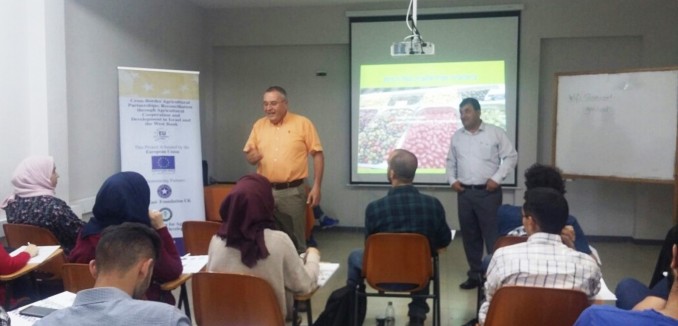On the first day of a pilot program pairing Israeli and Palestinian farmers interested in joint agricultural ventures, each population sat warily on opposite sides of the room.
Though all had agreed to be part of the trailblazing training program held at the Galilee International Management Institute (GIMI) on Kibbutz Mizra, significant social and linguistic barriers stood in their way.
“The biggest challenge was to overcome the notions we have of the ‘the other,’” says Silvana Nahmad, director of European and Mediterranean Affairs at GIMI. The program was funded by the European Union and developed in cooperation with a foundation that prefers not to be identified.
To be considered for the program, applicants had to have at least a bachelor’s degree in agriculture or a related field, such as water management, and a willingness to work together over a period of two years to launch businesses growing and exporting olives or dates, two of Israel’s largest crops.
Nahmad chose 10 Israeli participants and the partnering foundation chose 15 Palestinian participants, mostly between the ages of 23 and 50. Their initial seminars at GIMI last November focused on both the agricultural and business aspects of the future joint ventures.
Over the course of three five- to six-day learning modules at GIMI, “the participants had a lot of opportunities to speak to one another. They ate together in the kibbutz dining room and they went out to eat in Haifa and Acre together,” Nahmad tells ISRAEL21c.
“Only some of the Palestinians were able to speak English or Hebrew, and they helped the others. At the end of the three seminars we already had a few ideas for projects they can do together.”
Every Palestinian and Israeli submitting an approved joint business plan will receive a seed grant of €20,000 from the EU. During the two years of the project’s duration, the participants also will receive additional funding and professional mentoring.
Tzvi Keren, 50, of Rehovot, applied to the program after returning from two years in Angola running an egg farm supplying the local military. Keren was formerly a biology teacher, ran a chicken farm in Israel, and developed bio-hydroponic growing systems using waste from chicken and fish farms. He also has experience working with medicinal plants and permaculture.
“I saw this program as an opportunity to do something meaningful,” Keren tells ISRAEL21c.
While GIMI personnel strove to avoid contentious topics, Keren says they inevitably surfaced and emotions sometimes flared. “You had two groups in the middle of a political and cultural conflict and this was an elephant in the room,” he says.
Nevertheless, three Palestinian participants showed an interest in working with Keren. One woman who makes ceramic pots was intrigued by his plan for opening a hydroponic nursery that would sell products made in the Palestinian Authority territories. However, to move forward on this plan they will need a mentor to help them connect and communicate.
Another Palestinian participant, who grows greenhouse tomatoes, was interested in learning more about Keren’s organic water technologies; and another man who works in an agricultural supply company in Nablus promised to visit Keren in Rehovot the next time he goes to the nearby port of Ashdod to pick up shipments.
“I’m not sure how we can cooperate but I do hope we succeed,” says Keren. “I believe that it’s an important program and like every start it comes with challenges.”
GIMI President Joseph (Yossie) Shevel acknowledges that joint initiatives like this are fraught with stumbling blocks and setbacks. Just getting the training program off the ground was not a given.
“It’s never the right time and it’s always the right time” to launch such a program, he says.
“It’s not easy. There is a language barrier and we have to use interpreters. We will probably add a few workshops on conflict resolution. But we feel this is our vision, our mission. We see ourselves as one of the only bridges between these populations and we never give up.”
Years of experience lie behind that statement. Last summer alone, GIMI gave a training course to Jordanian, Palestinian and Israeli olive-oil producers, taught farmers from Palestinian Authority territories to grow avocados for export, and began planning a tele-course for Gazan computer engineers expected to be in high demand at Israeli companies as offshore contractors.
Cautiously optimistic, Shevel hopes at least three solid businesses will result from the two-year program.
All the participants, Shevel emphasized, “are very anxious to work together and develop relationships. They believe in cooperation.”
(via Israel21c)
[Photo: Israel21]




